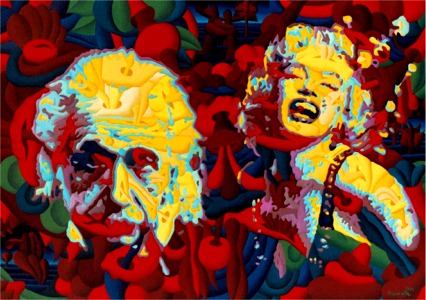April 22, 2005
Concise but perhaps profound (Or, who's verbose??)
I have found myself thinking about the profound nature of one of Tig's recent posts:
My ego is exceeded greatly by my own insignificance.Could this statement be akin to a very complex theory propounded by Michael Hoffman?
The ego-entity exists as a real set of patterns and dynamics, but the ego is not as solid, continuous, or powerful as it seems. The ego is both a set of real patterns, but also a projected, constructed image. In a way, the perceived ego exists, and in a way, it does not. The mind usually projects and constructs a fairly solid and simple image of oneself. Seeing the illusory aspects of this mental representation and feeling the absence of the accustomed sense of personal solidity can be experienced as death, as literal cessation of personal existence, because the naive mind strongly identifies with the projected image and the feeling of personal solidity.Regarding insignificance, a physicist noted the following:Mental processing is structured with the conscious ego-representation as the center of control and experiencing. This representation of the ego is a dynamic set of mental constructs. The ego-entity at the center of mental processing is partly an illusory projection. The ego includes the deceiving, projected representation of the ego-entity. This deceivingly tangible representation of the self or ego is only a part of the ego.
In a dissociative cognitive state, the usual cognitive structures constituting the ego relax, loosen, and disengage, while remaining available to a degree, as a tool. The projection of the ego image also ceases, unless called upon. Oneself still exists in many ways, such as a body, a brain, a mind, possessions, and a personal past. One genuine aspect of oneself has temporarily ceased to firmly exist: the egoic cognitive processing, which is largely but not entirely suspended. The projection of the self-image is also partly suspended. Insofar as the mind confuses the projected self-image with that part of the self which is genuine, that projected self never existed, other than a perceptual illusion, and so the projected self could not cease to exist.
If the ego is defined strictly as the natural assumption that the mentally projected self-representation is literally oneself, then the ego is only an illusion. But such a narrowed definition of "ego" ignores the real cognitive structures that reliably project that illusion. The ego, as a mode or subsystem of mental processing, is more than just the illusory aspect of the ego projection. The ego, considered as an entire subsystem of the mind, is a large, complex, and dynamic set of mental processes, of which the deceivingly tangible mental representation is only one part.
Humans seem to be extremely unimportant in the grand scheme of the Universe. This insight is often associated with Copernicus, who suggested (although not for the first time) that the Earth was not the centre of the Solar System. A bigger step towards calibrating our insignificance was taken by Edwin Hubble, who determined that astrophysical nebulae are really separate galaxies in their own right. We now think there are about one hundred billion such galaxies in the observable Universe, with perhaps one hundred billion stars per galaxy. But a metaphysically distinct blow to our importance came with the introduction of the idea of dark matter — we are not even made of the same stuff that comprises most of the Universe.

the surreal meeting of Einstein and Monroe explores relativity and our place in the Universe.